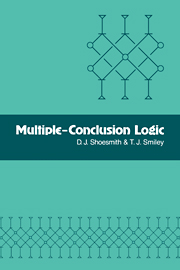12 - Infinite proofs
Published online by Cambridge University Press: 06 July 2010
Summary
Infinite arguments
The previous exposition of graph proofs has assumed that all rules R are finite, i.e. that X R Y only if X and Y are finite. Following the pattern of Chapter 6, we consider now the effects of allowing rules of inference with infinitely many premisses and conclusions, and consequently abandoning the requirement that graph arguments must be finite. Throughout this chapter the words ‘rule’ and ‘argument’ are to be interpreted in this wider sense, but the other definitions in the preceding chapters are taken over unchanged except insofar as this interpretation requires. Proofs may now be infinite even when the rules in question are finite, but they are never essentially infinite in such a case, for we show that every proof by finite rules has a finite subproof. A similar result holds for abstract proofs, qualified by the fact that the property of being a proof by finite rules is not an abstract one (cf. Theorem 11.1).
Theorem 12.1 Every proof (or abstract proof) by finite rules has a finite subproof (finite abstractly valid subproof).
Proof By the infinite analogue of 8.7 any proof by finite rules has a simple subproof π, each of whose strokes adjoins only finitely many edges. Let L be the calculus whose universe of formulae V is the union of the set Vπ of formulae occurring in π and the set S of strokes in π, and which is characterised by the rule R ‘from Xb,b infer Yb, if b ∈ S’.
- Type
- Chapter
- Information
- Multiple-Conclusion Logic , pp. 212 - 242Publisher: Cambridge University PressPrint publication year: 1978



